Big book aa chapter 5 – In the hallowed halls of recovery, Chapter 5 of the Big Book of Alcoholics Anonymous stands as a beacon of hope and guidance. It’s a roadmap for navigating the treacherous waters of addiction, a testament to the transformative power of surrender, honesty, and humility.
Within these pages lies the wisdom of those who have walked the path before us, offering solace and inspiration to those who seek redemption from the clutches of alcoholism.
Introduction

Chapter 5 of the Big Book of Alcoholics Anonymous, “How It Works,” is a pivotal chapter that delves into the practical steps and principles of the Alcoholics Anonymous (AA) program. It provides guidance to alcoholics seeking recovery and offers insights into the transformative power of the 12-Step program.
As you delve deeper into Big Book AA Chapter 5, remember that financial challenges may arise. If you’re facing financial difficulties while in Chapter 13, exploring personal loans while in Chapter 13 could be an option to consider. However, it’s crucial to proceed with caution and ensure that you have a solid plan in place before making any decisions.
Chapter 5 of the Big Book AA serves as a reminder to trust in a Higher Power and to seek support from others in your recovery journey.
The chapter’s primary purpose is to elucidate the mechanisms through which AA helps individuals overcome alcoholism. It addresses the psychological, emotional, and spiritual aspects of recovery, emphasizing the importance of surrender, humility, and a willingness to change. The target audience of this chapter is primarily individuals struggling with alcoholism who are seeking a path to sobriety and recovery.
Big Book AA Chapter 5 highlights the importance of working the Twelve Steps and finding a sponsor to guide us through the recovery journey. This journey can be challenging, and it’s easy to get lost along the way. Just like in the Mr.
Zombie Chapter 9 , the protagonist faced numerous obstacles and distractions that threatened to derail his progress. However, by staying committed to the Twelve Steps and seeking support from others, we can overcome these challenges and achieve lasting recovery, as described in Big Book AA Chapter 5.
Key Concepts and Principles: Big Book Aa Chapter 5

Chapter 5 of the Big Book introduces several key concepts and principles that are fundamental to the recovery process. These principles provide a framework for understanding addiction and the path to recovery.
One of the most important principles is the concept of surrender. Surrender is not about giving up or admitting defeat. Rather, it is about recognizing the powerlessness over addiction and the need for help. It is about letting go of the illusion of control and accepting the reality of the situation.
Honesty, humility, and self-reflection are also essential principles in recovery. Honesty involves being truthful with oneself and others about the nature of the addiction. Humility is about recognizing the limitations and the need for help from others. Self-reflection is about taking a hard look at the thoughts, feelings, and behaviors that contribute to addiction.
These principles are not easy to practice, but they are essential for recovery. By embracing these principles, individuals can begin to break free from the chains of addiction and build a healthier, more fulfilling life.
Surrender
Surrender is a key principle in recovery. It involves recognizing the powerlessness over addiction and the need for help. It is about letting go of the illusion of control and accepting the reality of the situation.
There are many ways to practice surrender. One way is to admit that you are powerless over addiction. This means acknowledging that you cannot control your thoughts, feelings, or behaviors when it comes to addiction. It also means accepting that you cannot change other people or situations.
Another way to practice surrender is to let go of the need to be in control. This means allowing things to happen without trying to force them to go your way. It also means accepting that you cannot always get what you want.
Surrender is not about giving up or admitting defeat. It is about recognizing the reality of the situation and taking steps to get help. By surrendering, you can begin to break free from the chains of addiction and build a healthier, more fulfilling life.
Honesty
Honesty is another essential principle in recovery. It involves being truthful with oneself and others about the nature of the addiction. This means admitting that you have a problem and that you need help. It also means being honest about your thoughts, feelings, and behaviors.
There are many ways to practice honesty. One way is to be honest with yourself about your addiction. This means acknowledging that you have a problem and that you need help. It also means being honest about your thoughts, feelings, and behaviors.
Another way to practice honesty is to be honest with others about your addiction. This means telling your family, friends, and therapist about your addiction. It also means being honest about your progress and setbacks.
Honesty is not always easy, but it is essential for recovery. By being honest with yourself and others, you can begin to break free from the chains of addiction and build a healthier, more fulfilling life.
Humility, Big book aa chapter 5
Humility is also an essential principle in recovery. It involves recognizing the limitations and the need for help from others. This means admitting that you cannot do it alone and that you need the support of others.
There are many ways to practice humility. One way is to admit that you cannot do it alone. This means recognizing that you need the help of others to recover from addiction. It also means being willing to accept help from others.
Another way to practice humility is to be grateful for the help that you receive. This means expressing gratitude to the people who support you in your recovery. It also means being grateful for the progress that you have made.
Humility is not about putting yourself down or thinking that you are less than others. It is about recognizing the reality of the situation and the need for help. By practicing humility, you can begin to break free from the chains of addiction and build a healthier, more fulfilling life.
Self-Reflection
Self-reflection is also an essential principle in recovery. It involves taking a hard look at the thoughts, feelings, and behaviors that contribute to addiction. This means understanding the triggers that lead to addiction and the patterns of behavior that maintain it.
There are many ways to practice self-reflection. One way is to keep a journal. This can help you to track your thoughts, feelings, and behaviors. It can also help you to identify the triggers that lead to addiction.
Another way to practice self-reflection is to talk to a therapist. A therapist can help you to understand the underlying causes of your addiction and develop strategies for coping with them.
Self-reflection is not always easy, but it is essential for recovery. By taking a hard look at the thoughts, feelings, and behaviors that contribute to addiction, you can begin to break free from the chains of addiction and build a healthier, more fulfilling life.
Practical Applications

Embracing the principles Artikeld in Chapter 5 is not merely an intellectual exercise; it’s a transformative journey that demands practical implementation in our daily lives. From finding a sponsor to navigating setbacks, here’s how you can put these principles into action:
Finding a Sponsor
A sponsor is an experienced member of Alcoholics Anonymous who provides guidance, support, and accountability. They’ve been through the recovery process themselves and can offer invaluable insights and encouragement. Finding a sponsor is crucial for your recovery journey. They can help you work the 12 steps, stay connected to the program, and provide a listening ear during challenging times.
Working the 12 Steps
The 12 steps are a roadmap to recovery, a structured process that guides you through self-discovery, amends, and spiritual awakening. Working the steps with a sponsor involves honestly examining your life, admitting your shortcomings, and taking action to make amends. It’s a challenging but profoundly rewarding journey that can lead to lasting sobriety and personal growth.
Navigating Challenges and Setbacks
Recovery is not a linear path; setbacks are inevitable. When you encounter challenges, it’s important to remember that you’re not alone. Reach out to your sponsor, attend meetings, and stay connected to the AA community. Remember, setbacks are opportunities for growth and learning. They can help you identify your triggers, develop coping mechanisms, and strengthen your resolve to stay sober.
Closing Summary

Chapter 5 of the Big Book is not merely a chapter; it’s a lifeline for those seeking recovery. Its principles provide a framework for personal transformation, a path towards a life free from the shackles of addiction.
By embracing the lessons enshrined within these pages, we can unlock the potential for lasting sobriety and embark on a journey of self-discovery and purpose.

Big Book AA Chapter 5 delves into the concept of a higher power, encouraging readers to embrace a force greater than themselves for guidance and support. This idea resonates with the theme of redemption and rebirth found in the villainess lives twice chapter 1 , where the protagonist embarks on a journey of self-discovery and transformation.
Ultimately, both works emphasize the importance of seeking purpose and meaning beyond oneself, fostering a sense of hope and resilience.